By Leen Randell
Updated: Jul 04, 2024
10 Best Herbal Decoctions For Flatulence
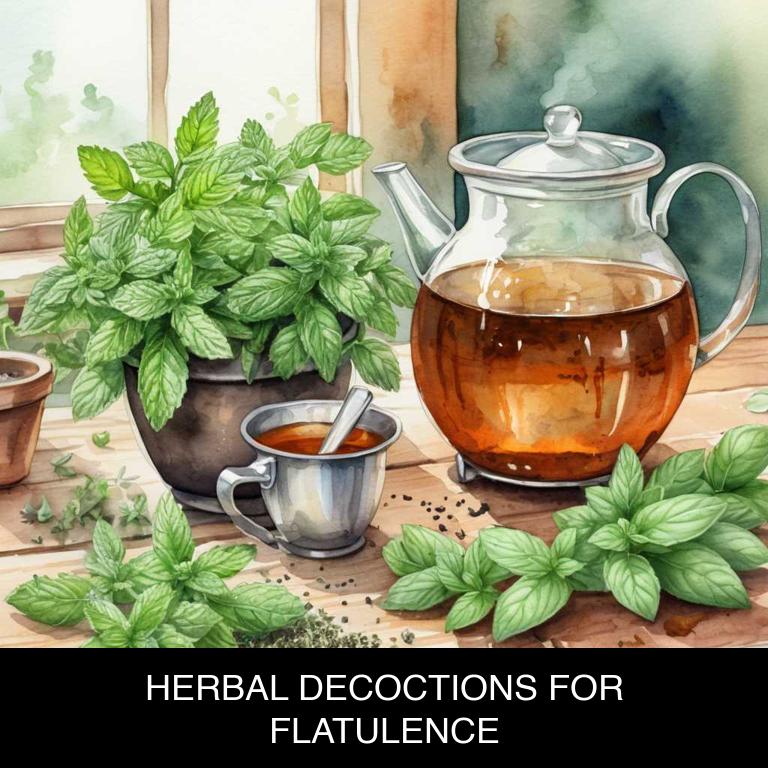
Herbal decoctions for flatulence are a natural remedy that uses plant-based ingredients to alleviate symptoms of bloating, discomfort, and odor associated with flatulence.
These decoctions work by stimulating digestion, reducing inflammation in the gut, and relieving spasms that can cause gas buildup. Examples of herbs used in these decoctions include peppermint, ginger, and chamomile, which can be made into teas or infused in hot water to provide relief from uncomfortable flatulence.
By using herbal decoctions for flatulence, individuals can enjoy improved digestion, reduced discomfort, and increased confidence in their daily lives.
The following article describes in detail the most important decoctions for flatulence, including medicinal properties, parts of herbs to use, and recipes for preparations.
- 1. Mentha x piperita
- 2. Zingiber officinale
- 3. Foeniculum vulgare
- 4. Anethum graveolens
- 5. Petroselinum crispum
- 6. Matricaria chamomilla
- 7. Melissa officinalis
- 8. Salvia officinalis
- 9. Thymus vulgaris
- 10. Rosmarinus officinalis
- What is the best combination of herbal decoctions to use for flatulence?
- What ailments similar to flatulence are treated with herbal decoctions?
1. Mentha x piperita
Peppermint decoctions helps with flatulence because it contains menthol, a natural compound that relaxes the muscles in the digestive tract.
This relaxation reduces muscle spasms and cramping that can cause bloating and gas to build up, ultimately alleviating discomfort. Additionally, peppermint's anti-inflammatory properties may help soothe the gut lining, reducing irritation and inflammation that can contribute to flatulence.
By calming and soothing the digestive system, peppermint decoctions provide relief from uncomfortable symptoms associated with flatulence.
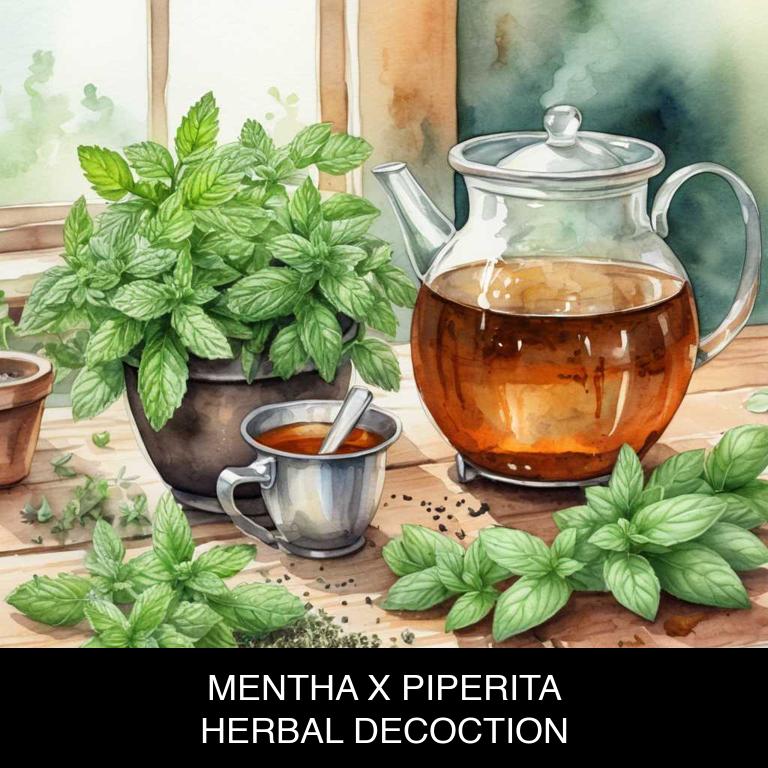
Medicinal Constituents
The list below shows the primary medicinal constituents in Mentha x piperita decoctions that help with flatulence.
- Limonene: This terpene has been shown to have carminative properties, helping to reduce gas and alleviate symptoms of flatulence.
- Rosmarinic acid: As a phenolic compound, rosmarinic acid has anti-inflammatory and antioxidant properties, which may help to soothe the digestive tract and reduce inflammation associated with flatulence.
- Menthol: This terpene has natural antispasmodic properties, which can help to relax the muscles in the digestive tract, reducing cramps and discomfort associated with flatulence.
Parts Used
The list below shows the primary parts of peppermint used to make decoctions for flatulence.
- Leaves: The most used part of Mentha x piperita for making decoctions to alleviate flatulence due to their high concentration of essential oils, particularly menthol, which helps relax the digestive tract.
- Stems: The stems of Mentha x piperita are used for decoctions to treat flatulence because they contain a higher concentration of menthone, a natural compound that helps reduce gas and alleviate discomfort.
- Roots: The roots of Mentha x piperita are used in decoctions to treat flatulence because they contain a higher concentration of menthol and other compounds that help relax the digestive system and reduce gas.
Quick Recipe
The following recipe gives a procedure to make a basic peppermint for flatulence.
- Harvest 20-30 grams of fresh mentha x piperita leaves and flowers for optimal flavor and aroma.
- Clean the harvested mentha x piperita thoroughly by rinsing with cold water to remove dirt.
- Combine 20-30 grams of cleaned mentha x piperita with 500 milliliters of boiling water to create decoction.
- Simmer the decoction for 10-15 minutes to allow the mentha x piperita essence to infuse into water.
- Strain the decoction through a fine-mesh sieve and discard the solids to obtain the final product.
2. Zingiber officinale
Ginger decoctions helps with flatulence because of its unique combination of bioactive compounds, particularly gingerols and shogaols.
These molecules have potent anti-inflammatory and carminative properties, which help to soothe and calm the digestive tract, reducing bloating and discomfort caused by excessive gas production. Ginger also stimulates digestion and improves gut motility, allowing for smoother elimination of trapped gases and relief from flatulence.
Regular consumption of herbal ginger decoctions can provide long-term benefits in managing flatulence and promoting a healthier digestive system.
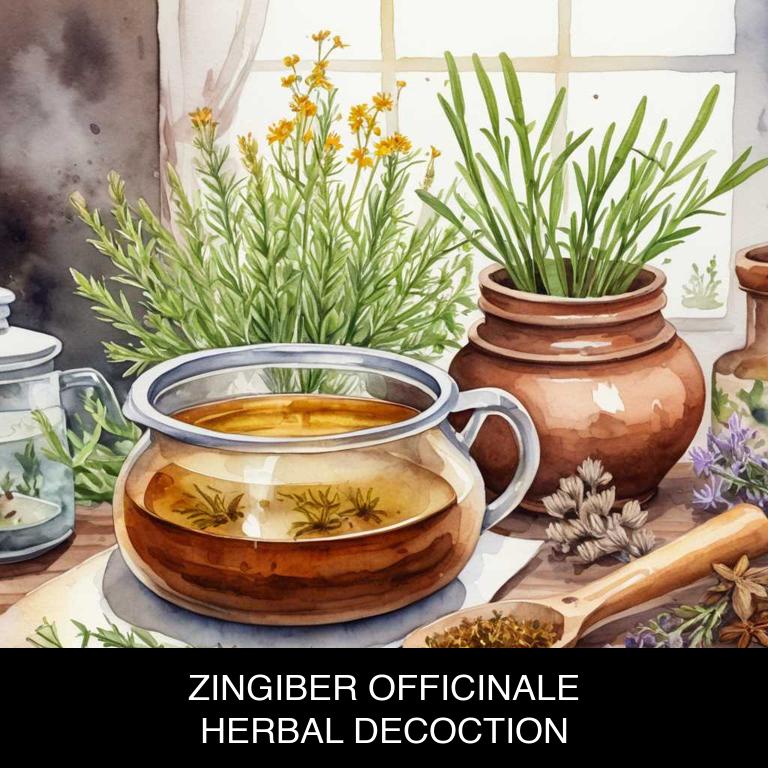
Medicinal Constituents
The list below shows the primary medicinal constituents in Zingiber officinale decoctions that help with flatulence.
- Gingerols: These sesquiterpene compounds help alleviate flatulence by inhibiting the production of gas-producing enzymes in the gut.
- Shogaols: Similar to gingerols, shogaols are bioactive compounds that have anti-inflammatory and carminative properties, which help reduce bloating and discomfort associated with flatulence.
- Zingibain: A proteolytic enzyme found in ginger, zingibain helps break down proteins in the digestive tract, reducing the likelihood of gas accumulation and subsequent flatulence.
Parts Used
The list below shows the primary parts of ginger used to make decoctions for flatulence.
- Roots: The roots of Zingiber officinale are also frequently used in decoctions to treat flatulence, as they contain similar bioactive compounds to the rhyzome that help to soothe the digestive system and reduce gas.
- Stems: The stems of Zingiber officinale are occasionally used in decoctions to treat flatulence, particularly in traditional medicine practices, as they contain some of the same active compounds as the rhyzome and roots, although in smaller quantities.
Quick Recipe
The following recipe gives a procedure to make a basic ginger for flatulence.
- Gather 1-2 teaspoons of fresh zingiber officinale rhizomes or 1/2 teaspoon dried powder for decoction preparation.
- Cut the fresh zingiber officinale rhizomes into small pieces or crush the dried powder to enhance extraction.
- Combine the prepared zingiber officinale with 2 cups of boiling water for a 5-minute infusion period.
- Reduce the heat to low and simmer the mixture for 10-15 minutes to release active compounds.
- Strain the decoction through a fine-mesh sieve into a clean container and discard the solids.
3. Foeniculum vulgare
Fennel decoctions helps with flatulence because of its natural ability to soothe and calm the digestive system.
The herb contains a compound called anethole, which has been shown to reduce the production of gas in the intestines by relaxing the muscles in the digestive tract and reducing inflammation. This can help to alleviate symptoms such as bloating, discomfort, and embarrassing gas.
Additionally, fennel decoctions have natural carminative properties, which means they can help to release trapped gas and promote regular bowel movements, leading to a flatter stomach and increased confidence.
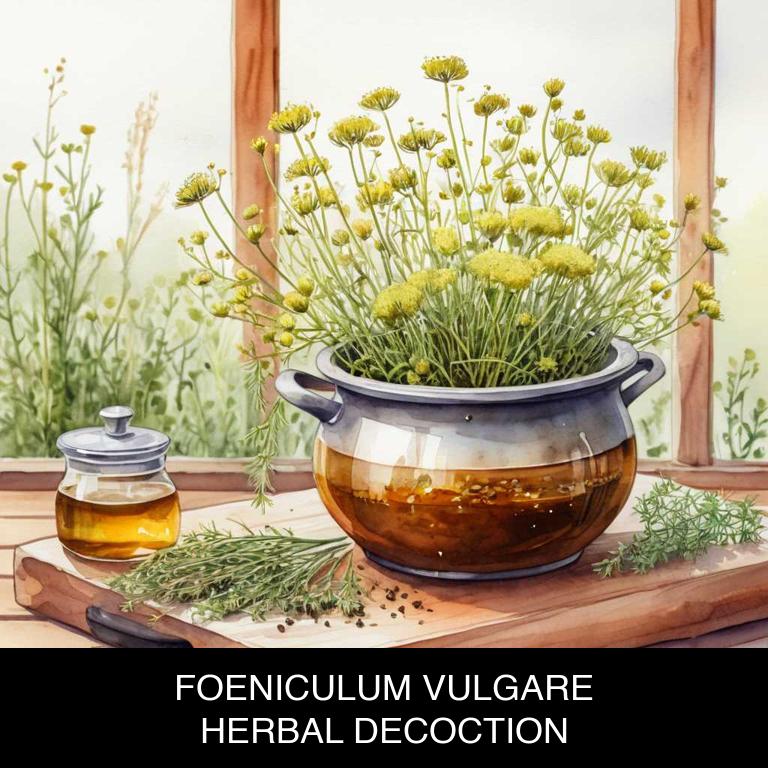
Medicinal Constituents
The list below shows the primary medicinal constituents in Foeniculum vulgare decoctions that help with flatulence.
- Anethole: Anethole is a terpene alcohol that acts as a carminative, helping to reduce gas and alleviate flatulence by relaxing the muscles in the digestive tract and reducing the release of gas.
- Foeniculin: Foeniculin is a phenolic compound that exhibits anti-inflammatory properties, reducing inflammation in the digestive tract and alleviating symptoms of flatulence.
- Limonene: Limonene is a terpene that has been shown to have anti-flatulent properties by reducing the amount of gas produced in the digestive tract and improving digestion.
Parts Used
The list below shows the primary parts of fennel used to make decoctions for flatulence.
- Seeds: They are commonly used due to their high essential oil content, particularly anethole, which is known for its carminative properties.
- Leaves: Fennel leaves are used in decoctions because they contain compounds like volatile oils and flavonoids, which have been traditionally used to alleviate gas and bloating.
- Stems: Fennel stems are also used in decoctions due to their high concentration of essential oils, particularly anethole, which helps in reducing gas and bloating symptoms.
Quick Recipe
The following recipe gives a procedure to make a basic fennel for flatulence.
- Collect fresh or dried foeniculum vulgare plant material in quantities of 1 tablespoon per 8 ounces water.
- Combine the foeniculum vulgare plant material with 8 ounces boiling water in a heat-resistant container.
- Allow the mixture to steep for 5 to 10 minutes before straining it.
- Strain the mixture through a cheesecloth or fine-mesh sieve into a clean container.
- Discard the solids and store the foeniculum vulgare decoction in the refrigerator for up to 24 hours.
4. Anethum graveolens
Dill decoctions helps with flatulence because it has natural carminative properties that aid in reducing gas and bloating.
The herbal remedy contains compounds like dill oil, which has a calming effect on the digestive system, helping to relieve discomfort and reduce symptoms associated with irritable bowel syndrome (IBS). Additionally, dill's antispasmodic properties help relax the muscles in the digestive tract, allowing for smoother digestion and elimination of gas.
This natural remedy can provide fast and effective relief from flatulence, leaving you feeling more comfortable and confident.
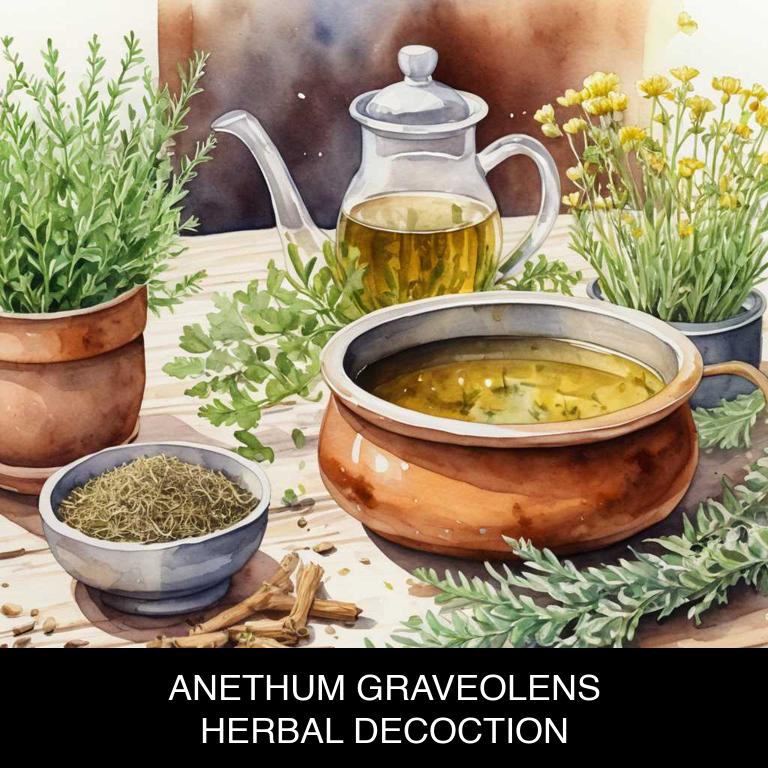
Medicinal Constituents
The list below shows the primary medicinal constituents in Anethum graveolens decoctions that help with flatulence.
- Dill apiole: Dill Apiole is a monoterpene that helps to reduce flatulence by relaxing the muscles in the digestive tract and improving digestion.
- Ligustilide: Ligustilide is a sesquiterpene lactone that has anti-inflammatory and antispasmodic properties, which help to calm the digestive system and alleviate gas buildup.
- Anethole: Anethole is an aromatic terpene that has carminative properties, which help to release trapped gas in the digestive system and relieve bloating and discomfort.
Parts Used
The list below shows the primary parts of dill used to make decoctions for flatulence.
- Seeds: They contain carvone, a compound that helps to relax the muscles in the digestive tract and reduce gas.
- Leaves: They are rich in essential oils, including carvone and limonene, which have anti-flatulent properties and help to ease digestion.
- Stems: They are also a source of carvone and other essential oils, which contribute to their flatulence-relieving properties when used in decoctions.
Quick Recipe
The following recipe gives a procedure to make a basic dill for flatulence.
- Harvest fresh anethum graveolens leaves and flowers in the morning after the dew has dried completely.
- Clean the anethum graveolens leaves and flowers thoroughly using distilled water to remove any dirt or debris.
- Combine 2 tablespoons of fresh anethum graveolens leaves and flowers with 1 liter of boiling water and steep for 5 minutes.
- Strain the decoction through a cheesecloth or a fine-mesh sieve to remove the solids and discard the solids.
- Store the decoction in a clean glass bottle in the refrigerator for up to 2 days to preserve its potency.
5. Petroselinum crispum
Parsley decoctions helps with flatulence because its bioactive compounds, particularly flavonoids and carotenoids, possess potent digestive properties.
The decoction's anti-inflammatory and antioxidant effects help soothe and calm the gut, reducing inflammation and irritation that can contribute to gas and bloating. Additionally, parsley's natural oils and volatile compounds help to stimulate digestion, improve gut motility, and break down food more efficiently, thus alleviating symptoms of flatulence.
This holistic approach promotes a healthier digestive system and reduces the likelihood of uncomfortable gas and bloating.
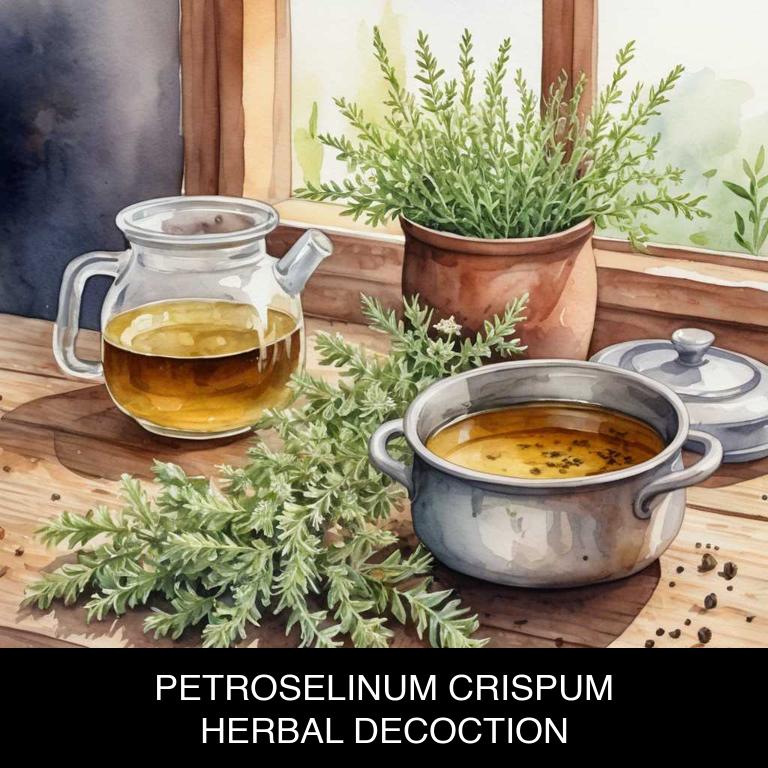
Medicinal Constituents
The list below shows the primary medicinal constituents in Petroselinum crispum decoctions that help with flatulence.
- Apigenin: This flavonoid compound has been shown to have anti-inflammatory properties, which can help alleviate the discomfort associated with flatulence by reducing inflammation in the digestive tract.
- Beta-carophyllene: As a sesquiterpene, beta-carophyllene has been found to have anti-inflammatory and carminative properties, which can help to relax the muscles in the digestive tract and reduce the formation of gas.
- Myristicin: This phenylpropene has been shown to have carminative and anti-inflammatory properties, which can help to reduce the symptoms of flatulence by relaxing the muscles in the digestive tract and reducing inflammation.
Parts Used
The list below shows the primary parts of parsley used to make decoctions for flatulence.
- Leaves: The leaves of Petroselinum crispum are commonly used to make decoctions for flatulence due to their carminative properties, which help to ease digestion and reduce gas.
- Stems: The stems of Petroselinum crispum are used to make decoctions for flatulence as they contain compounds that help to relax the muscles in the digestive tract and alleviate discomfort.
- Seeds: The seeds of Petroselinum crispum are used to make decoctions for flatulence due to their ability to stimulate digestion and relieve symptoms of bloating and gas.
Quick Recipe
The following recipe gives a procedure to make a basic parsley for flatulence.
- Harvest 20-30 grams of dried petroselinum crispum leaves or stems from a reliable source.
- Clean the harvested petroselinum crispum by rinsing with cold filtered water to remove impurities.
- Combine the cleaned petroselinum crispum with 500 milliliters of boiling distilled water in a heat-resistant container.
- Steep the mixture for 5-7 minutes to allow the herbs to release their bioactive compounds.
- Strain the decoction through a cheesecloth or a fine-mesh sieve into a clean container.
6. Matricaria chamomilla
Chamomile decoctions helps with flatulence because of its soothing properties that ease digestive discomfort.
The apigenin present in chamomile has a calming effect on the muscles in the stomach and intestines, reducing spasms and cramps that can cause gas and bloating. Additionally, chamomile's anti-inflammatory compounds help to reduce inflammation in the digestive tract, which can also contribute to flatulence.
By relaxing the digestive system, chamomile decoctions can help to alleviate symptoms of flatulence, leaving you feeling more comfortable and at ease.
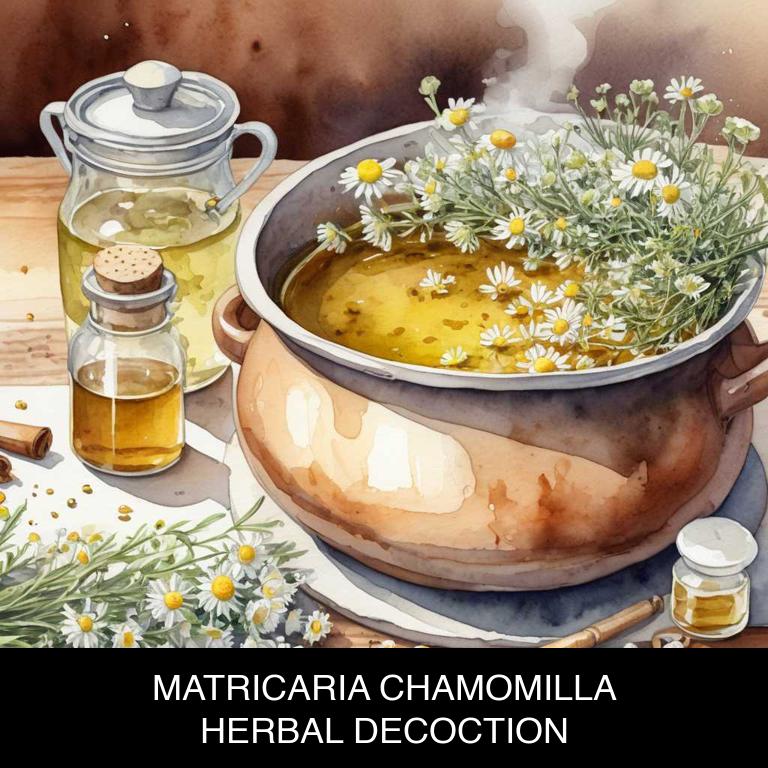
Medicinal Constituents
The list below shows the primary medicinal constituents in Matricaria chamomilla decoctions that help with flatulence.
- Apigenin: This flavonoid helps with flatulence by reducing inflammation in the digestive tract and promoting relaxation, which can alleviate symptoms of gas and bloating.
- Luteolin: This flavonoid has been shown to have anti-inflammatory properties and can help soothe the digestive system, reducing irritation and discomfort associated with flatulence.
- Matricaria chamomilla terpenes: These volatile oils, particularly bisabolol and alpha-bisabolol, have anti-inflammatory and antispasmodic effects, which can help alleviate cramps and discomfort associated with gas and bloating.
Parts Used
The list below shows the primary parts of chamomile used to make decoctions for flatulence.
- Flowers: They are used due to their anti-inflammatory and soothing properties, which help to calm digestive issues.
- Leaves: They are used because of their ability to reduce inflammation and ease digestive discomfort.
- Seeds: They are used due to their carminative properties, which help to prevent the formation of gas in the digestive system.
Quick Recipe
The following recipe gives a procedure to make a basic chamomile for flatulence.
- Gather 1 to 2 teaspoons of dried matricaria chamomilla flowers to create a soothing decoction.
- Combine the dried flowers with 8 ounces of boiling water in a heat-resistant glass cup.
- Steep the mixture for 5 to 10 minutes to allow the herbal properties to infuse into the liquid.
- Strain the decoction using a fine-mesh sieve or cheesecloth to remove the plant material.
- Drink the warm matricaria chamomilla decoction immediately to experience its therapeutic benefits.
7. Melissa officinalis
Lemon balm decoctions helps with flatulence because of its ability to soothe the digestive system and reduce inflammation in the gut.
The herbal tea has a calming effect on the stomach, which can help to alleviate symptoms such as bloating and discomfort. Additionally, lemon balm's carminative properties allow it to gently ease gas out of the body, reducing the frequency and severity of flatulence.
This natural remedy can provide relief from embarrassing and uncomfortable situations.
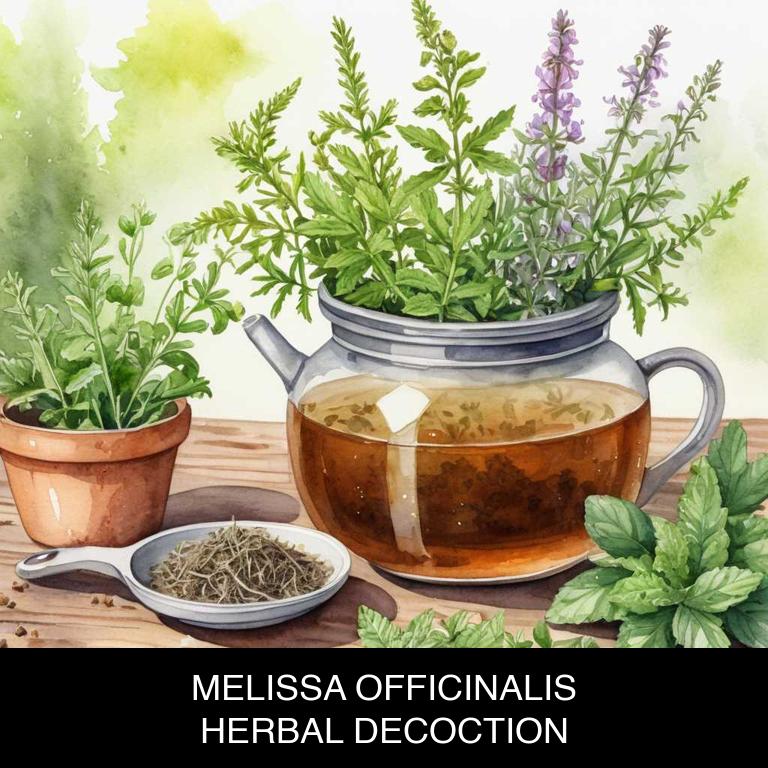
Medicinal Constituents
The list below shows the primary medicinal constituents in Melissa officinalis decoctions that help with flatulence.
- Lemonine: A terpene compound found in Melissa officinalis, lemonine has been shown to have carminative properties, helping to relieve flatulence by reducing gas production in the digestive system.
- Oleanolic acid: A triterpenoid compound present in Melissa officinalis, oleanolic acid has been found to exhibit anti-inflammatory and antioxidant properties, which may help alleviate flatulence symptoms by reducing inflammation in the digestive tract and protecting against oxidative stress.
- Rosmarinic acid: A phenolic compound found in Melissa officinalis, rosmarinic acid has been reported to possess antioxidant and anti-inflammatory properties, which may help combat flatulence by reducing inflammation and oxidative stress in the digestive system and alleviating symptoms such as bloating and discomfort.
Parts Used
The list below shows the primary parts of lemon balm used to make decoctions for flatulence.
- Leaves: The leaves of Melissa officinalis are used to make decoctions for flatulence because they contain essential oils that help to ease digestive issues and reduce gas.
- Stems: The stems of Melissa officinalis are used to make decoctions for flatulence because they contain compounds that help to soothe the digestive system and reduce inflammation.
- Roots: The roots of Melissa officinalis are used to make decoctions for flatulence because they contain active compounds that help to calm the digestive system and reduce flatulence.
Quick Recipe
The following recipe gives a procedure to make a basic lemon balm for flatulence.
- Gather 2 tablespoons of dried melissa officinalis leaves and flowers.
- Combine the dried melissa officinalis with 1 quart of boiling water.
- Steep the mixture for 5 to 10 minutes or until the liquid has cooled.
- Strain the decoction through a cheesecloth or a fine-mesh sieve into a bowl.
- Store the cooled decoction in a dark glass bottle in the refrigerator for up to 2 days.
8. Salvia officinalis
Sage decoctions helps with flatulence because they contain bioactive compounds that have a natural antispasmodic effect on the digestive tract.
The volatile oils present in sage, such as thujone and camphor, can relax the muscles in the intestines and reduce the frequency and intensity of gas release. Additionally, sage's carminative properties can help to break down and expel trapped gases, providing relief from bloating and discomfort.
This natural remedy has been used for centuries to soothe digestive issues and promote healthy gut function.
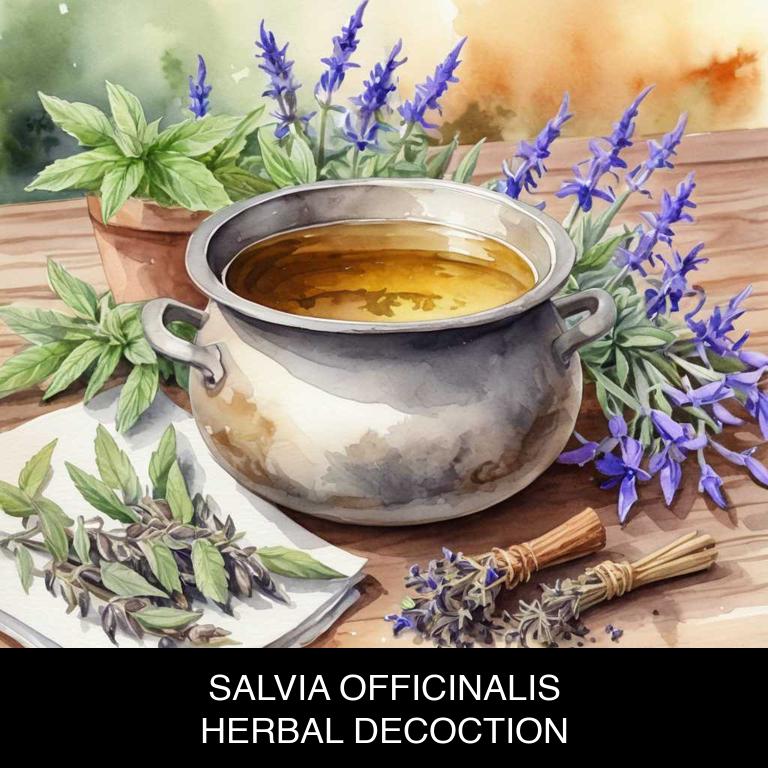
Medicinal Constituents
The list below shows the primary medicinal constituents in Salvia officinalis decoctions that help with flatulence.
- Ursolic acid: A triterpenoid compound found in Salvia officinalis, ursolic acid has anti-inflammatory and carminative properties, which help to reduce inflammation and prevent the formation of gas in the digestive tract, thereby alleviating flatulence.
- Rosmarinic acid: A phenolic diterpenoid, rosmarinic acid acts as an anti-spasmodic and carminative agent, which helps to relax the muscles in the digestive tract, reduce gas production, and prevent the release of gas, ultimately relieving flatulence.
- Salvianolic acid a: A hydrolysable tannin, salvianolic acid A exhibits anti-inflammatory and antioxidant properties, which help to reduce inflammation and oxidative stress in the digestive tract, thereby preventing the formation of gas and alleviating flatulence.
Parts Used
The list below shows the primary parts of sage used to make decoctions for flatulence.
- Leaves: They are the most commonly used part due to their high concentration of volatile oils and other compounds that help alleviate flatulence.
- Stems: The stems of Salvia officinalis contain a significant amount of flavonoids, which contribute to their carminative properties and help in relieving flatulence.
- Roots: The roots of the plant are also used to make decoctions for flatulence due to their content of bitter compounds, which have been traditionally used to soothe digestive issues.
Quick Recipe
The following recipe gives a procedure to make a basic sage for flatulence.
- Harvest fresh leaves of salvia officinalis in the morning after the dew has evaporated for best flavor.
- Dry the harvested leaves in a warm place for 1 week or until they become brittle and crumbly.
- Measure 1 teaspoon of dried salvia officinalis leaves per 8 ounces of boiling water for decoction.
- Steep the dried leaves in boiling water for 5-10 minutes to allow the herbs to infuse.
- Strain the decoction through a fine-mesh sieve or cheesecloth to remove the herb particles.
9. Thymus vulgaris
Thyme decoctions helps with flatulence because of its unique composition that soothes digestive issues.
The active compounds in thyme, such as thymol and carvacrol, have natural anti-inflammatory properties that help to reduce inflammation in the digestive tract. This alleviates discomfort and cramping associated with flatulence, while also inhibiting the growth of bacteria that can contribute to excessive gas production.
By promoting a healthy gut environment, thyme decoctions can help to alleviate symptoms of flatulence, providing relief from bloating, discomfort, and embarrassment.
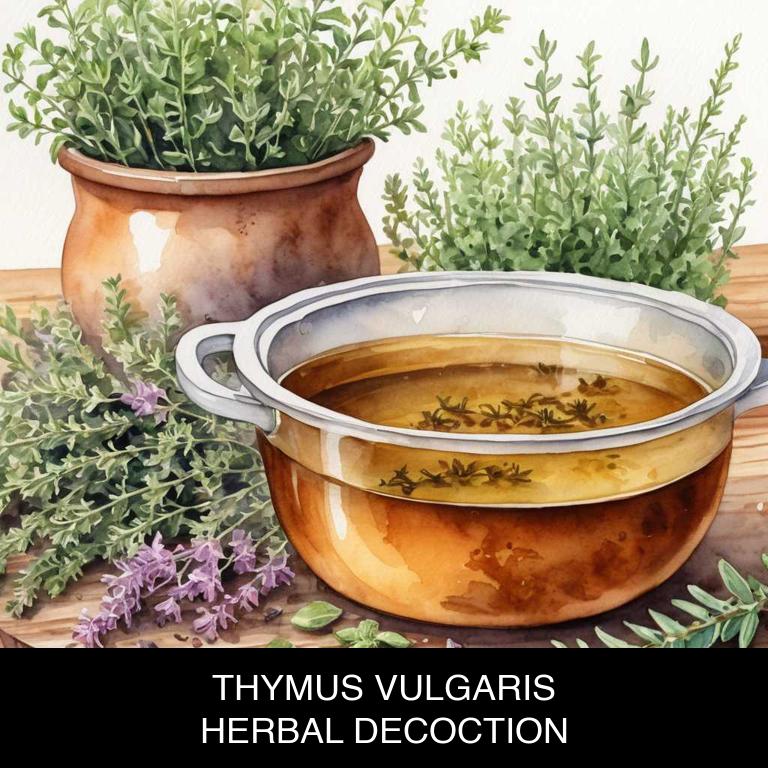
Medicinal Constituents
The list below shows the primary medicinal constituents in Thymus vulgaris decoctions that help with flatulence.
- Thymol: Thymol has carminative properties, helping to relieve flatulence by reducing the production of gas in the digestive system.
- Caryophyllene: Caryophyllene is a sesquiterpene that has been shown to have anti-inflammatory and antimicrobial properties, which can help alleviate flatulence by reducing inflammation in the digestive tract and preventing the growth of bacteria that produce gas.
- Rosmarinic acid: Rosmarinic acid is a phenolic compound that has antioxidant and anti-inflammatory effects, which can help reduce inflammation and oxidative stress in the digestive system, thereby alleviating symptoms of flatulence.
Parts Used
The list below shows the primary parts of thyme used to make decoctions for flatulence.
- Leaves: Thymus vulgaris leaves are commonly used due to their high concentration of volatile oils, particularly thymol, which have carminative and anti-inflammatory properties.
- Stems: Thymus vulgaris stems are used for their ability to release essential oils when broken or bruised, providing a natural remedy for digestive issues like flatulence.
- Roots: Thymus vulgaris roots are utilized for their rich store of essential oils and antioxidants, which can help to soothe the digestive system and reduce flatulence.
Quick Recipe
The following recipe gives a procedure to make a basic thyme for flatulence.
- Gather 1/2 cup of fresh thymus vulgaris leaves or 1 tablespoon dried leaves.
- Chop the leaves into small pieces to increase their surface area for infusion.
- Combine the chopped leaves with 2 cups of boiling water and let steep for 5-10 minutes.
- Strain the mixture through a fine-mesh sieve or cheesecloth to remove the solids.
- Store the decoction in a glass bottle in the refrigerator for up to 3 days.
10. Rosmarinus officinalis
Rosemary decoctions helps with flatulence because it contains compounds that help to reduce inflammation in the digestive tract, which can contribute to gas and bloating.
The volatile oils present in rosemary, such as borneol and bornyl acetate, have been shown to relax the muscles in the intestinal wall, reducing spasms and allowing for smoother digestion.
Additionally, rosemary's antimicrobial properties help to reduce the growth of bad bacteria in the gut that can ferment undigested food particles and produce gas.
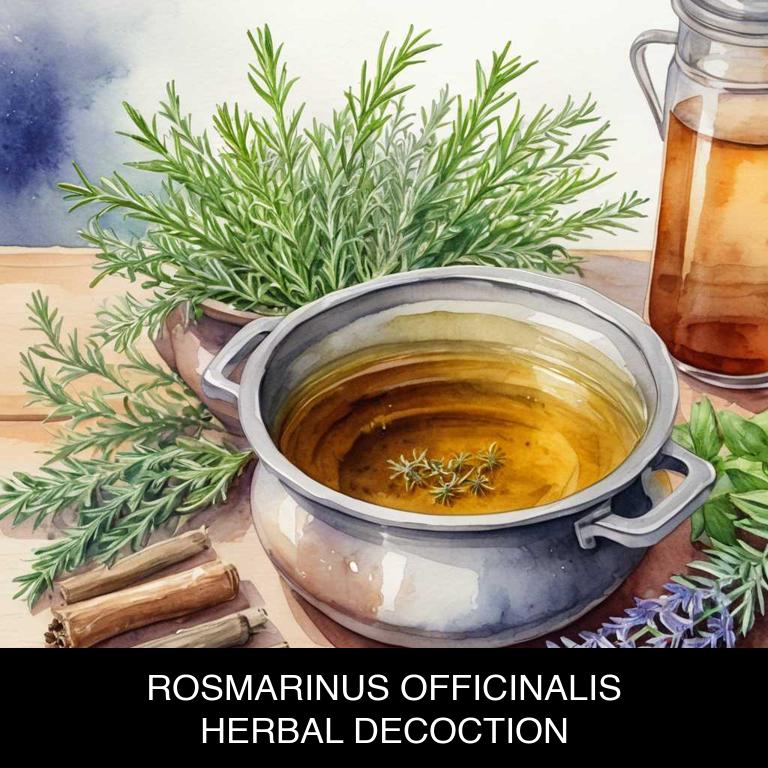
Medicinal Constituents
The list below shows the primary medicinal constituents in Rosmarinus officinalis decoctions that help with flatulence.
- Caryophyllene: This sesquiterpene acts as an anti-inflammatory agent, which helps to reduce inflammation in the digestive tract and alleviate symptoms of flatulence.
- Rosmarinic acid: As a polyphenolic compound, rosmarinic acid exhibits antioxidant and anti-inflammatory properties, helping to soothe and protect the digestive tract, thereby reducing flatulence.
- Cineole: This terpene has carminative properties, which help to ease digestion, reduce the formation of gas in the digestive system, and alleviate flatulence symptoms.
Parts Used
The list below shows the primary parts of rosemary used to make decoctions for flatulence.
- Leaves: Used for their carminative and anti-inflammatory properties to ease digestive discomfort and reduce gas.
- Stems: Utilized for their antispasmodic properties to help alleviate cramping and discomfort associated with flatulence.
- Flowers: Employed for their aromatic properties to help reduce nausea and ease digestive issues related to gas and bloating.
Quick Recipe
The following recipe gives a procedure to make a basic rosemary for flatulence.
- Measure 1-2 teaspoons of dried rosmarinus officinalis flowers to prepare the herbal decoction.
- Combine the measured rosmarinus officinalis flowers with 8 ounces of boiling water in a heat-resistant container.
- Steep the mixture for 5-7 minutes to allow the herbs to release their active compounds.
- Strain the decoction through a fine-mesh sieve or cheesecloth into a clean glass container.
- Allow the decoction to cool to room temperature before refrigerating or freezing for later use.
What is the best combination of herbal decoctions to use for flatulence?
The best combination of herbal decoctions that help with flatulence is a blend of Peppermint, Ginger, and Fennel.
Peppermint soothes the digestive system and calms the stomach, while Ginger stimulates digestion and reduces inflammation. Fennel seeds release carminative properties, easing gas and bloating. This trio works in harmony to alleviate discomfort, promoting a balanced gut and healthy elimination.
Drinking a warm decoction of equal parts Peppermint, Ginger, and Fennel can provide quick relief from flatulence and promote overall digestive well-being.
What ailments similar to flatulence are treated with herbal decoctions?
Ailments similar to flatulence/decoctions.html">flatulence/decoctions.html">flatulence that are treated with herbal decoctions are digestive disorders such as bloating, indigestion, and constipation.
Herbs like peppermint, ginger, and fennel are commonly used to alleviate symptoms of irritable bowel syndrome (IBS), which can manifest as abdominal discomfort, gas, and changes in bowel movements.
Other herbs like chamomile and licorice root may also be used to soothe the digestive tract and reduce inflammation.